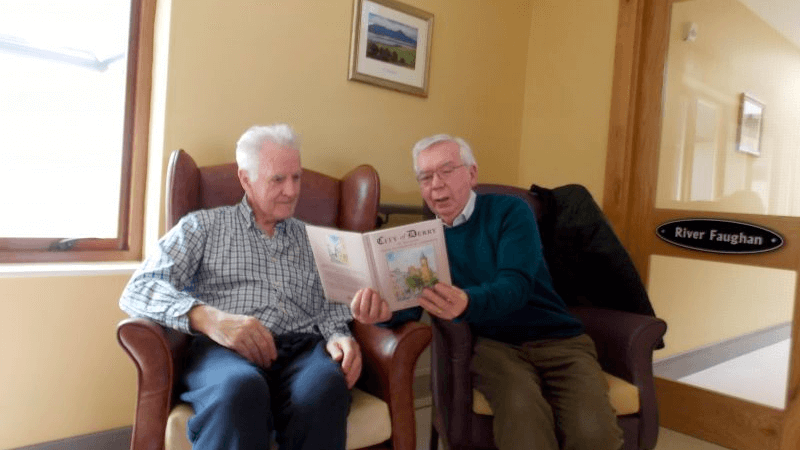Our Research and Evaluation Manager, Dr Carina Spaulding, and Dr Louisa Thomson at Renaisi, a social enterprise appointed to carry out the evaluation of Reading Friends, wrote a blog for What Works Wellbeing on the impact of Reading Friends. This is an amended version of the original article which was first published on 15 January 2020 in What Works Wellbeing.
In 2017, The Reading Agency launched Reading Friends with funding from the National Lottery Community Fund. Delivered by local partners using volunteers, Reading Friends uses reading to get vulnerable and isolated older people, including carers and people with dementia, chatting.
Designing and evaluating a co-produced programme
As part of Reading Friends, we have prioritised the importance of contributing to a wider evidence base on effective approaches. Renaisi was appointed as our evaluation and learning partner from the start of the project, exploring both the process of setting up and delivering this model and its impact.
Both the delivery and evaluation of Reading Friends are deeply rooted in co-production. The programme was co-created with older people and local project partners, resulting in a unique reading befriending model. Groups meet regularly in venues including libraries, care homes, prisons and community centres. Projects can also arrange one-to-one and one-off sessions. The model ensures that the programme can be delivered flexibly, respond to people’s needs, host organisations’ structures and approaches, and the local context.
Challenges of evaluating unique delivery models
A pragmatic evaluation was co-produced through a series of workshops with older people. In these workshops, we developed and tested different tools that could be used across the Reading Friends sites. The steer was to focus on understanding what the project is achieving and tailoring the questions to those activities.
The research tools we developed continue to be refined based on a process of regular feedback and reflection. We have run training sessions for delivery partners to encourage greater ownership over the evaluation and build confidence in collecting data. Some participants have been empowered to be Evaluation Champions – observing activities and reflecting with peers on their exper
iences, exploring where Reading Friends fits in the context of their daily lives, and the value it has added.
Contributing to the evidence base
We have closely followed the development of the Office of National Statistics (ONS) national loneliness indicators and debated if and how to incorporate these into the evaluation tools. However, the messages from our co-production activities were strongly in favour of asset-based language, avoiding stigmatising wording that might risk upsetting a participant or even their withdrawal from the programme.
We have included some questions from validated national surveys – for example, asking both participants and volunteers to indicate if they had people to call on for company or to socialise – a question from the Community Life Survey. This allowed us to see that, across both groups, there were increases in the average number of people reporting ‘definitely agree’ at the end of their involvement with a Reading Friends project.
However, we have also been clear about the limits around using this data to compare the Reading Friends cohort with the wider population. To align with the flexibility of the Reading Friends model, evaluation data is collected by staff, volunteers, participants themselves, partners, carers or others. Therefore, any attempt to compare this data with a national data set would be invalid due to the variety of approaches to collection.
Through Reading Friends, we are continuing to learn and adapt – about where the potential in the programme model lies to encourage social interaction and connections to others, and how we capture this in a proportionate way that inspires those involved to contribute to the evaluation.
We are keen to feed our experiences and evidence into future conversations around the new National Loneliness Strategy and the development of a much-needed national dataset. Our experience to date indicates the importance of positive language and approaches when talking about loneliness, as well as sensitivity to the challenges in evaluating emergent projects delivered through multiple community partnerships.
Get involved
Find out more about Reading Friends, and sign-up as either a volunteer or participant.
This article is an amended version of an article published on 15 January 2020 on What Works Wellbeing.
